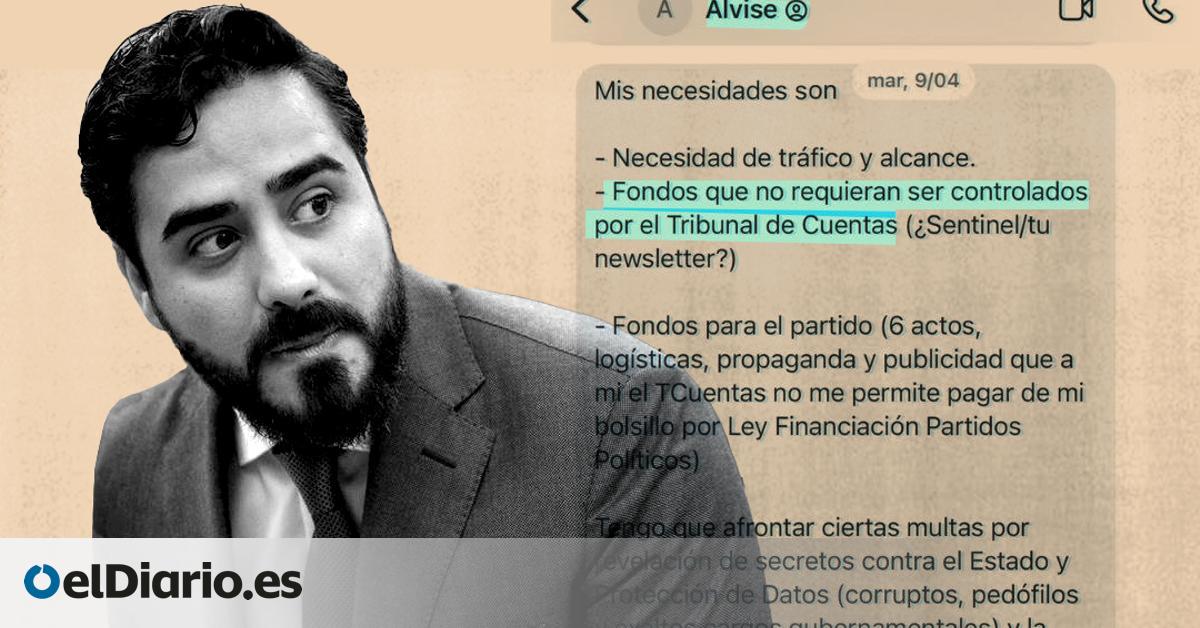
The founder of Madeira Invest Club (MIC), the investment office sponsored by Alvise Pérez and which closed unexpectedly last week, claims in a letter to the Attorney General’s Office that he gave 100,000 euros in cash during the European election campaign to the then candidate and now MEP. According to the documentation provided to the Public Prosecutor’s Office, the payment was received in person in Madrid by Alvise on May 27, days before the European elections in which his group Se Acabó la Fiesta (SALF) obtained more than 800,000 votes.
This is stated in the document that the creator of MIC, Álvaro Romillo, also known on social networks with the pseudonym ‘Luis Cryptospain’, has submitted to the Public Prosecutor’s Office. The confession is accompanied by abundant documentation: conversations in which Alvise participates and which the crypto businessman has provided to the Public Prosecutor’s Office in case they constitute a crime, accompanied by an expert report that proves their veracity. Romillo puts himself at the “disposition” of Justice and offers to liquidate his assets to compensate his investors with the assets he still holds and the money that appears in Portuguese bank accounts, according to elDiario.es. During the afternoon of this Tuesday, this newspaper tried to contact the MEP through his telephone, his email and one of his advisors and received no response.
The €100,000 was handed over to Alvise at the offices of Sentinel BQ, a company owned by the same person as MIC, which has 5,000 fortified safe deposit boxes in the centre of Madrid and which allows money to be exchanged under a promise of total confidentiality: behind the back of the Treasury and bypassing the anti-fraud measures that financial institutions are obliged to follow. Alvise Pérez was summoned to the offices on Calle Maldonado in Madrid at 4pm on 27 May, two weeks before the European elections. It was an employee of the company who, according to the story and evidence provided to the Prosecutor’s Office by the founder of MIC, gave him the money in cash.
After the delivery, the now MEP confirmed to Romillo via text message that he had received the money. That same morning he had told him in another message that these funds were very useful for financing the campaign. Days before, at 12:51 on April 9, Alvise had told him of his “needs”, among which he mentioned “funds that do not need to be controlled by the Court of Auditors” to pay for rallies, advertising and campaign events.
Conversation between Alvise and the founder of MIC in which the ultra-right activist explains that he wants funds that do not have to be studied by the Court of Auditors.
Alvise’s objective, as he himself told his interlocutor, was to raise “between 300,000 and 360,000 euros” to cover the electoral campaign and pay the “suppliers” he was contacting. He also referred to the need to obtain “funds for the party” which, he regretted, he could not pay out of his own pocket due to the limits of the regulations on financing political parties. But also, he said, to be able to deal financially with the electoral promise of avoiding his salary and with the “fines” that, he claims, he has to pay for “revealing secrets.”
Various messages provided to the Prosecutor’s Office show that Alvise wanted the money, at least in part, to finance his journey to Brussels. “We urgently need funds for the campaign; digital, physical, audiovisual, propaganda, logistics, etc.” He also explains that a collection of money through Sentinel would not be a bad idea, given that one of his star promises is the donation of his salary as a MEP: “As I am going to give up 100% of my public salary, that would also be good for me to finance the political adventure.”
On May 25, Romillo created four for him wallets [monederos digitales donde están las criptomonedas] to raise funds from his followers. Almost immediately, Alvise made the payment addresses public via his Telegram channel, which at the time had almost half a million followers. “Faced with banking limitations, squirrels are organizing themselves in the crypto world,” wrote the now MEP.
A day later, the founder of MIC informed him that he had already raised just over 7,000 euros, but the leader of SALF said that the amount was not enough to cover the expenses of his race for the European Parliament. “That’s great! But it’s going too slowly. I’m running out of time to pay for the campaign,” Alvise replied. A day later, a message arrived from the leader of Madeira Investment Club informing him that he could drop by the offices of Sentinel in Madrid to collect 100,000 euros in cash.

Message from the founder of MIC explaining to Alvise the ‘wallets’ he has created for him (left), message that Alvise posted on his Telegram shortly after spreading these ‘wallets’ to receive donations (right).
Identical speeches “against the State”
The relationship between the SALF leader and the founder of the failed investment club began at the end of March this year, according to the documentation that the latter has submitted to the Public Prosecutor’s Office. More than a month after Alvise announced on his Telegram channel that he was running for the European elections in June and made public some of his big promises, such as the raffle of his salary.
Several months of conversations provided to the Prosecutor’s Office reveal that cryptocurrencies and confidential financing channels are, from the beginning, the great interest that both have in common. Alvise takes just a few days to comment on the possibility of opening wallets or virtual wallets to channel money. “Your argument is absolutely identical to mine against the State and that is why I want to support you,” Alvise states in one of the messages provided to the Public Prosecutor’s Office and in which he opens up to promote his company Sentinel.
The law on political party financing prohibits anonymous donations and establishes that political parties cannot accept or receive, directly or indirectly, donations from the same person exceeding 50,000 euros per year, nor donations from legal entities. In addition, all donations exceeding 25,000 euros must be notified to the Court of Auditors by the political party within three months of their acceptance.
Madeira Invest Club closed suddenly on Monday, September 16. Until then, it had captivated hundreds of investors thanks to the exorbitant returns it offered, of up to 53%, with supposed investments in digital and intangible works of art and other luxury goods. The National Securities Market Commission (CNMV) issued an alert about this investment club on May 22, 2023, and warned that the company was not authorized to carry out activities reserved for collective investment institutions.
The National Court has already received several complaints from those affected, who have filed charges against those responsible for fraud, misappropriation, criminal organisation, falsification of commercial documents or money laundering. In his letter to the Public Prosecutor’s Office, Romillo offers to liquidate his assets to compensate the investors, who may number several hundred and who have lost tens of millions of euros, according to the aforementioned complaints.
If you have more information about this case or know of other similar ones, you can write to us at [email protected]
Source: www.eldiario.es

